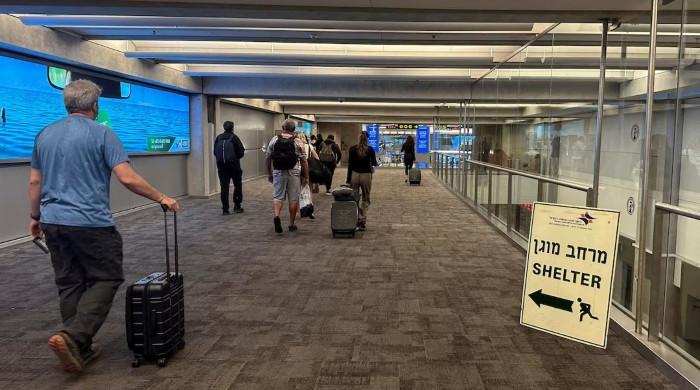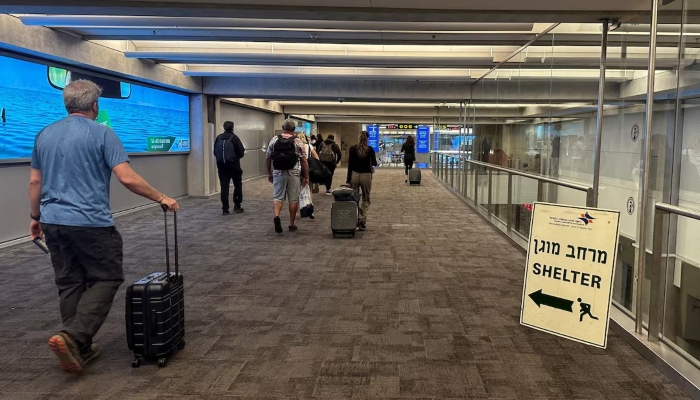The ongoing conflict between Israel and Iran has led to the cancellation of 6,000 flights worldwide over the past two days.
Aviation sources said Tel Aviv’s Ben Gurion Airport has been the hardest hit, while airports in Damascus, Baghdad, Tehran, Beirut, and Amman’s Queen Alia Airport remain shut without interruption.
Airspace over Iran, Iraq’s capital Baghdad, and Israel has remained closed for two consecutive days. Limited overflights through Jordan, Lebanon, and Syria are permitted only with prior approval and under partial restrictions, the sources added.
Tel Aviv Airport in Israel operates flights to 100 airports in 44 countries daily, while Queen Alia Airport in Amman operates flights to 81 airports in 40 countries every day.
Damascus Airport in Syria provides service to 20 airports in 13 countries, and Baghdad Airport in Iraq to 32 airports in 18 countries.
Tehran Airport in Iran serves 51 airports in 23 countries, while Beirut Airport in Lebanon operates flights to 49 airports in 26 countries.
According to data from FlightRadar, 3,000 flights are being cancelled daily from these airports, with a large number of others also affected.
Israel on Friday said it targeted Iran’s nuclear facilities, ballistic missile factories and military commanders at the start of what it warned would be a prolonged operation to prevent Tehran from building an atomic weapon.
Tel Aviv’s Ben Gurion Airport was closed and Israel’s air defence units stood on high alert following the announcement.
Israel’s El Al Airlines said it had suspended flights to and from Israel as did Air France and budget carriers Ryanair and Wizz. Delta Air Lines suspended flights to Tel Aviv through the end of August.
Wizz said it had re-routed flights affected by closed airspace in the region for the next 72 hours. Israeli airlines El Al, Israir and Arkia were moving planes out of the country.
FlightRadar data showed airspace over Iran, Iraq and Jordan was empty, with flights directed towards Saudi Arabia and Egypt instead.
The escalation of the Middle East conflict knocked shares in airlines around the world on Friday with British Airways owner IAG down 4.6%, Delta Air Lines down 4%, and Ryanair off 3.5%. A surge in oil prices after the attack also stirred concerns about jet fuel prices.
Many global airlines had already halted flights to and from Tel Aviv after a missile fired by Yemen’s Houthi rebels towards Israel on May 4 landed near the airport.
Iranian airspace has been closed until further notice, according to state media and notices to pilots.
Air India, which flies over Iran on its Europe and North American flights, said several flights were being diverted or returned to their origin, including ones from New York, Vancouver, Chicago and London.
Germany’s Lufthansa said its flights to Tehran have been suspended and that it would avoid Iranian, Iraqi and Israeli airspace for the time being.
Emirates also cancelled flights to and from Iraq, Jordan, Lebanon, and Iran while Qatar Airways axed flights to Iran, Iraq and Syria.
Iraq early on Friday closed its airspace and suspended all traffic at its airports, Iraqi state media reported.
Eastern Iraq near its border with Iran contains one of the world’s busiest air corridors, with dozens of flights crossing between Europe and the Gulf, many on routes from Asia to Europe, at any one moment.
Jordan, which sits between Israel and Iraq, also closed its airspace several hours after the Israeli campaign began.
Russia’s civil aviation authority Rosaviatsia said it had instructed Russian airlines to stop using the airspace of Iran, Iraq, Israel and Jordan until June 26. It said flights to airports in Iran and Israel were also off limits for civil carriers.
— With additional input from Reuters


